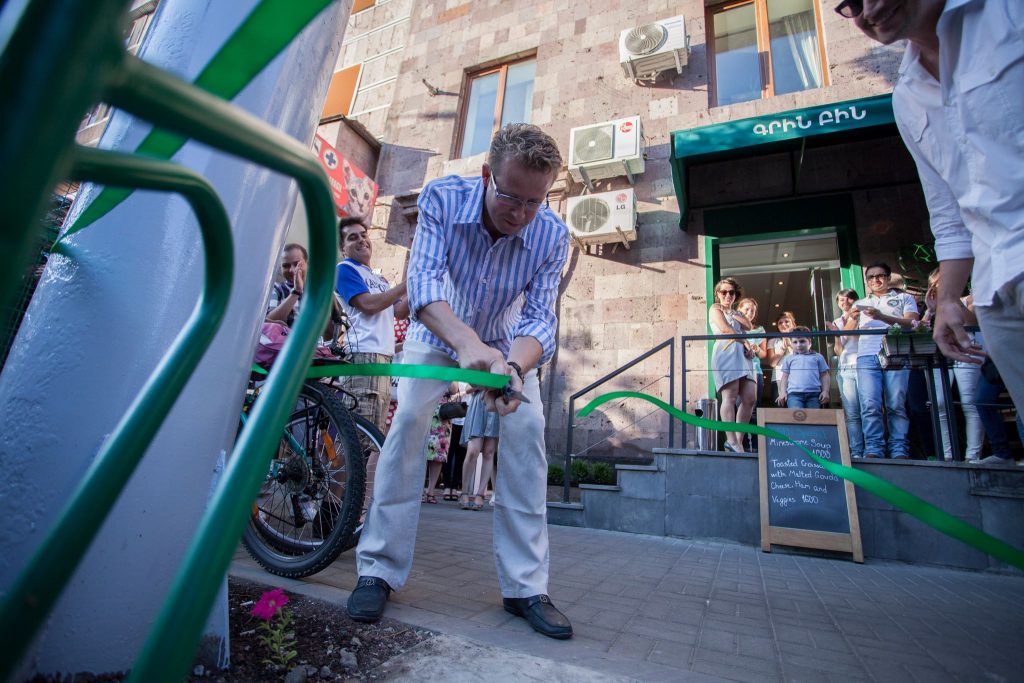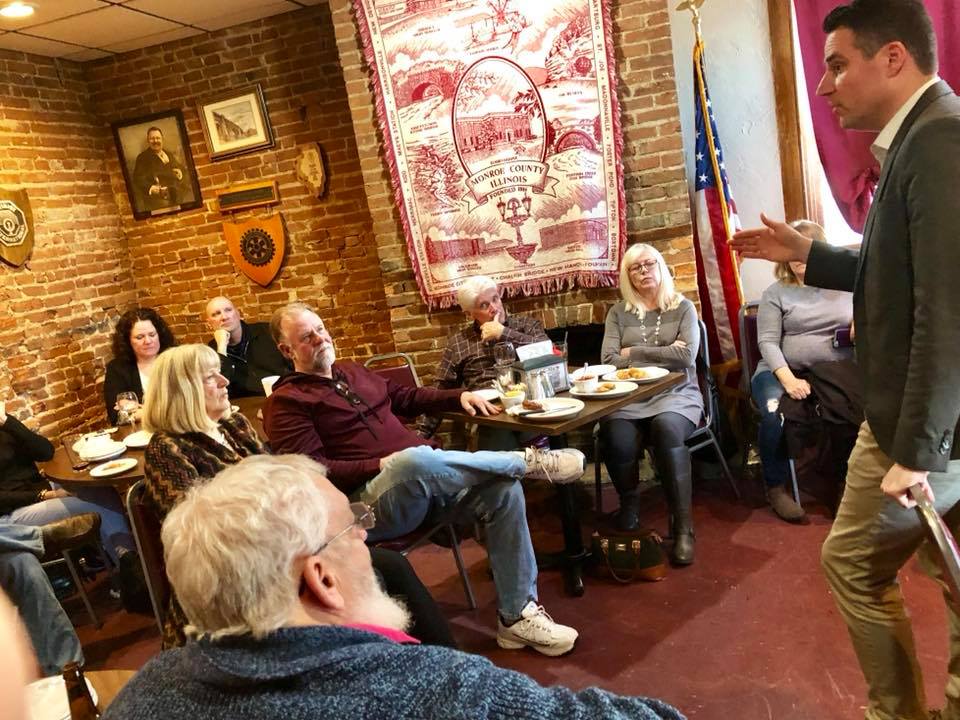Inside a modestly-sized café on Amiryan Street in downtown Yerevan, Westerners tinker away on tiny laptops. Workers from a local non-profit hash out the morning gossip. Young people from the city’s bearded creative class dash in and out, reveling in the morning rush. The bitter aroma of coffee grinds lingers heavily in the air. And an entire wall is decorated, shrine-like, with locally-produced goods for sale: trinkets made ethically by women in villages; all-natural, herbal soaps; and—the ultimate rarity—locally grown quinoa.
Armenians have always loved their surj (coffee), but the phenomenon of coffee shops doubling as socially responsible hubs in the community is a fairly recent trend. And it all started with a little café called The Green Bean.

A photo from 2013 of Green Bean co-founder Ivan Schaerli cuts the ribbon on new bike racks in front of the store, where customers can leave their bikes. (Photo: The Green Bean)
The Green Bean is an institution in modern Yerevan—one of the very first cafés to forbid smoking indoors in a city that is now, six years later, teeming with non-smoking venues. “When we first opened, we were told it wouldn’t work,” says David Bequette, one of the Green Bean’s founders. “I guess it was a little risky, but it was also just great timing because what was brave and out of the box then, everybody’s doing now.”
The Green Bean helped pioneer a cultural movement, and today it’s a successful, local chain in Armenia. But last year, Bequette relinquished his rights to the brand. He no longer owns a cent of it. In fact, he and his wife, Dr. Irina Ghaplanyan, who helped co-found the café in 2012, have divested all their business interests, as they moved to Bequette’s hometown in Illinois last spring. “It just seemed like the right thing to do as we moved into the next stage of our lives,” says Bequette. He recently announced his campaign to run for Congress in Illinois’ 12th District.
Home Is Where the Part(isan Divide) Is
Bequette was born to middle-class parents in Columbia, a well-to-do, little city of about 10,000 in Southwestern Illinois on the border of Monroe and St. Clair counties. His father was an auto-body industry worker and his mother rotated between being a stay-at-home mom and waitress for most of his childhood. After graduating high school, he attended college in St. Louis (while the metropolis is located in a different state, it is only 25 minutes from his home) for a year, but ended up dropping out and joining the Marines five months later.
While in the Marines, he was stationed in locations all over the world, like Indonesia, China, and Malta (where he and Ghaplanyan met). His decision to move to Yerevan came in 2011, as he followed Ghaplanyan, who was performing the research portion of her doctorate on political corruption (now a book). He quickly made the city his new home.
Within a year, Bequette embarked on his first business venture, an agricultural product called FruitsMax—a chewable tablet made of 21 fruits and probiotics. In 2012, they founded the Green Bean, and in addition to that, the two also both taught at the local university, and launched an NGO to help young athletes access international marathons and opportunities.
Bequette’s work also saw him become an outspoken critic for a better climate for business and politics in Armenia. In 2013, he joined the board of American Chamber of Commerce of Armenia, lobbying for a better environment for small businesses.
“For me Armenia opened my eyes to diplomacy, building businesses for meaning, how important service and giving was, and what it truly meant for people to be in need, says Bequette, “But it also gave me a fresh perspective on how much work we have to do in some areas in the U.S.”
In 2015, around the same time his progressive politics were beginning to find a home Armenia, they were losing their influence in his native Illinois. The 2016 Presidential Election notwithstanding, Bequette recalls watching from his apartment near Barekamutyun Metro, as Democrats lost a 20-year seat in his district’s Congressional elections. Republican Mike Bost secured the seat with a 10 percent margin.
The Curious Case of Illinois’ 12th District
In many ways, Bequette’s district epitomizes the American political moment. It’s one of 70 swing districts being targeted by the Democrats in which the last election was won by 15 percent of the vote or less.
According to 2016 data from the U.S. Census Bureau, the 12th district has the second lowest median household income in the state (about $47,500) and the sixth highest rate of unemployment (nearly seven percent—almost double what it is nationally). Disenfranchised by their region’s steady economic decline under the Democrats, voters swung a hard right. But Bequette believes the conservative swing is not truly representative.
“Illinois, and specifically, Southern Illinois is the cross-section of American life,” he says. It’s a curious cocktail of traditional and cosmopolitan values, “a Midwest, rust belt, bible belt rolled into the city life of St. Louis, sprinkled with the grit and poverty of East Saint Louis.” But it is also more than that.
He argues this region is actually a liberal hub. It’s home to Illinois’ largest demographic of African-Americans outside of Chicago (a figure which hovers around 17 percent) and a large environmentalist population, leaking in from nearby universities. It is the only Congressional district in Illinois to have a consistent Green Party presence on its ballot each election; students and academics researching the dangers of regional industries, like coal mining and the more imminent threat of fracking—which is has recently taken flight in the area. In the last election alone, they secured an impressive six percent of the vote (six times the national Green Party average).
Bequette is confident about their chances to win back the district, which boasts 140,000 registered Democrats—nearly 35 percent higher than registered Republicans. The main problem, he says, is that too many have been “sitting on the sidelines”—not because there aren’t enough of them, but because the candidates their party is pushing don’t really represent their interests.
Pointing to his opponent this year in the Democratic primaries, Brendan Kelly, who has served as State’s Attorney of St. Clair County since 2012, he complains that every election there are the “same type of people try to run—a small group of elites, lawyers from St. Clair County.”
These types of candidates, Bequette says, are called “Blue Dogs.” The term is a reference to the “Blue Dog Coalition,” a caucus formed in 1995 out of representatives from the Democratic party with centrist views, to bridge the ever-widening chasm between liberal and conservative agendas.
So while some argue that a more centrist approach is the only way to bring unity to a polarized country, Bequette believes that, at least for his district, it’s actually doing the opposite. By trying so hard to “bridge the divide,” he says, Democrats have really just ostracized their very own.
The Battle to Get on the Ballot
Last September, Bequette went about gathering the signatures he needed to petition for his eligibility to run for office. He needed 816 signatures from registered voters; he secured 1,192. Soon after, he received word that his petition had been challenged.
Bequette and Ghaplanyan maintain that while they don’t yet have hard evidence, they are convinced the challenge is in some way linked to his opponent’s team, and even went so far as to suggest the legal expenses for the challenge may have been funded by the Democratic Congressional Campaign Committee (DCCC), which has showed early interest in Kelly.

Bequette and Kelly, opponents in the Democratic primaries, speak at a Women’s Forum in their district. (Photo: David Bequette for Congress)
When contacted for comment, Kelly’s campaign manager, Sam Barrett, rejected the allegations, stating instead that their team was happy about Bequette’s decision to run. He said the petition was made instead by a “local activist,” identified in a report by the Madison-St. Clair Record as Lynda Lee Sparks-Franklin. The report also states that the challenger has gone by four different names and suggests potential ties to the Democratic establishment.
Bequette remains skeptical. “The point with primaries is to get more people involved now than before. If you don’t get them involved now, if you ostracize them, if you kick their candidates off the ballot early or try to meddle in their affairs, then what happens is you get more frustration, more pent up anger, and there’s a chance that they’re going to protest and not vote again come the midterms.”
In the end, the objection was overruled, but it was a close call. Of the 1,192 signatures Bequette’s campaign gathered, only 823 were declared valid in the end. That sounds like a lot of invalid signatures. But Ghaplanyan, defending their situation, says the discrepancy is a result of too-frequently “purged” voters’ lists and inaccurate addresses. It happens a lot, she says, as voters don’t always stay in the same place for a long time—particularly in low-income areas.
There’s Always the Armenians
Bequette’s agenda is incredibly progressive, but he says that matters little to the local Armenians in his community. His district is home to two Armenian churches—St. Gregory the Illuminator in Granite City and Holy Virgin Mary and Shoghagat in Belleville. It’s one of the larger Armenian hubs in the midwest.
The interests of these constituents, he says, transcends notions of “right” and “left,” which he describes as “refreshing.” He offered an anecdote about a deacon at one of the churches—a prominent lawyer and friend of Kelly’s—who told him that the Armenian connection was enough to secure his vote with Bequette.
“We’re very strong on [Armenian] Genocide recognition, Karabagh (Artsakh), pretty much the entire platform of strengthening Armenia-U.S. relations. I’m already going to represent everything they want represented, and I’m going to do it from a position of familiarity and genuine care for Armenian causes.”
Recently, echoing this sentiment, Armenian National Committee of America’s (ANCA) local chapter—the Armenian National Committee of Southern Illinois—announced its official support for Bequette’s campaign.
Pushing Past the Establishment
Hard to believe that opening a café in a post-Soviet country over 6,000 miles away can have anything remotely in common with a campaign for U.S. Congress in Illinois, but it seems wherever he is, some kind of threat to the status quo is never too far behind—be it a challenge to the cigarette-smoking population of Armenia, or a less straightforward push towards a more inclusive and progressive Democratic establishment.
Primaries for the 12th District are slated for March 20 and Bequette believes that his name on the ballot alone will be enough to bring thousands of people, who would otherwise have been “sitting out on the sidelines.” If, come primaries, he loses, Bequette says it will be a gracious defeat, and he plans to rally behind whoever wins, encouraging his followers to do the same (“Whatever we have to do to win, we will do it.”).
“But if they were to have successfully kicked me off the ballot,” he adds after a moment’s pause, “they might have lost an opportunity to connect with a lot of voters, and they’re doing that now. We’re doing that right now.”
The post From Cafés in Yerevan to Congressional Seats in Illinois appeared first on The Armenian Weekly.
Source: Armenian Weekly
Link: From Cafés in Yerevan to Congressional Seats in Illinois





